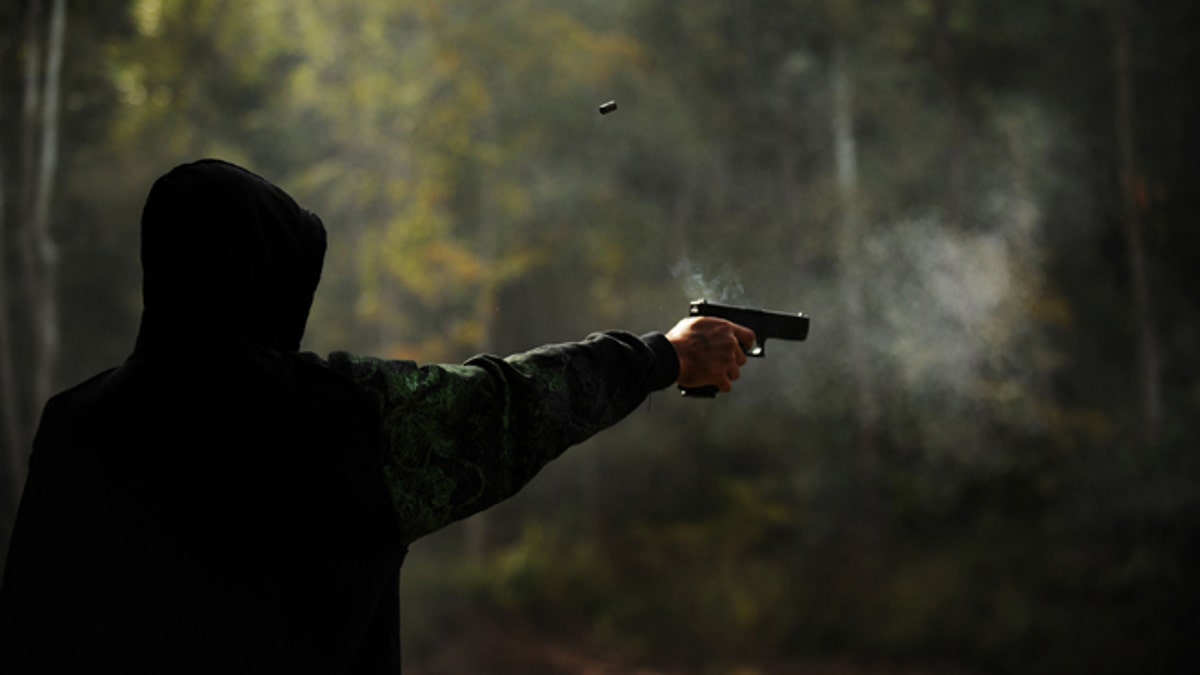
WEST POINT, KY - OCTOBER 10: Alex Soballe, 17, of Chicago, Ill. shoots a 9mm handgun at the Knob Creek Machine Gun Shoot on October 10, 2009 in West Point, Kentucky. The Supreme Court is currently hearing a portion of last year's Second Amendment case, District of Columbia v. Heller, that found that the amendment protects a person's right that the federal government can not abridge. (Photo by Matt McClain/Getty Images) (2009 Getty Images)
U.S. federal government officials in Illinois landed a series of heavy blows this week against notorious drug lord Joaquín "El Chapo" Guzmán's Sinaloa cartel – starting with the sentencing of twin brothers convicted of running a $2 billion North American drug ring and quickly followed by a federal indictment of nine alleged drug traffickers connected to the Mexican crime group.
While officials at the U.S. Attorney's Office in the Northern District of Illinois attempted to downplay the connection between Tuesday’s sentencing of Pedro and Margarito Flores to 14 years in prison and the indictment of the nine purported Sinaloa cartel associates, they did admit that the timing worked out well.
"In order to present this information the way we wanted it, it was best to announce the indictments on the same day as the sentencing of the two brothers," Randy Samborn, an assistant U.S. Attorney in the Northern District of Illinois, told Fox News Latino.
The Flores brothers were portrayed by prosecutors as among the most valuable traffickers-turned-informants in U.S. history and even Chief U.S. District Judge Ruben Castillo said he would have convicted the two to life in prison if it wasn't for their cooperation with the investigation into the Sinaloa Cartel.
The sentencing of the two brothers was the first time they have appeared in public since entering federal protective custody in 2008 and security at the U.S. District Court in Chicago was tighter than usual, with extra security checks outside courtroom doors and a bomb-sniffing dog sweeping for explosives.
Once agreeing to cooperate with U.S. law enforcement, the Flores brothers forfeited more than $3.6 million and secretly recorded conversations with high-level members of the Sinaloa cartel – including two directly made with "El Chapo" Guzman. The U.S. Attorney's office said that the Flores brothers' cooperation helped net indictments against leaders of the Sinaloa Cartel and the Beltrán Leyva Cartel. It also helped them seize hundreds of kilograms of cocaine and heroin and more than $15 million in cash in the Chicago area, along with the seizure of more than 1,600 kilograms of cocaine in the Los Angeles area that was bound for Chicago.
"The Flores brothers (and their families) will live the rest of their lives in danger of being killed in retribution," prosecutors stated in a sentencing memo. "The barbarism of the cartels is legend, with a special place reserved for those who cooperate."
The sentencing was followed by the indictment of nine alleged Sinaloa cartel members on drug trafficking and money laundering charges, along with the U.S. Treasury Department putting one of the men –Victor Felix Beltrán – on its Kingpin list. The Treasury Department's action freezes all his assets in the United States and prohibits U.S. citizens from doing business with him.
"With today's designation of Victor Felix Beltrán, we are yet again targeting Joaquin Guzman Loera's organization, one of the world's most influential drug trafficking networks," Adam J. Szubin, Director of Treasury's Office of Foreign Assets Control, said in a press release. "This action demonstrates our determination to target both emerging and established leaders within the Sinaloa Cartel, including Felix Beltrán as well as Alfonso Limon Sanchez, and to combat their illicit activities through financial sanctions."
Felix Beltrán – the son of a drug trafficker who worked for Guzmán's cartel – is known as a high-ranking member of the Sinaloa cartel in the Mexican cities of Culiacán and Guadalajara. His father, Victor Felix Felix, was arrested in March 2011 and his son has been running the organization since.
The other name to be added to the Kingpin list was Alfonso "Chubas" Limón Sánchez, who is a close associate of the Sinaloa Cartel leader and was charged with being a primary cocaine source of supply to him before his arrest in Mexico on November 18, 2014.
The sentencing of the Flores brothers and the unsealing of the indictment reveal the close ties between the Sinaloa cartel and Mexican drug traffickers operating in the Chicago area. The windy city is the No. 1 destination in the United States for heroin shipments, No. 2 for marijuana and cocaine, and No. 5 for methamphetamine – giving it the unsavory prize of being the only U.S. city to rank in the top five for all four major drug categories, according to a 2010 report by the U.S. Department of Justice.
The Flores twins were able to build their drug trafficking organization thanks in large part to their childhood friendships in Chicago's Latino-centric Little Village neighborhood. Their network, which eventually was run from a Mexican ranch, stretched from its Chicago hub to New York, Detroit and Washington, D.C., and to Los Angeles and Vancouver, British Columbia.
The Chicago area has seen a slew of murders in recent years, with 425 people being killed within the city limits alone in 2014. While most of the murders were not cartel or cartel-related crime, many experts say that the drugs are fueling gang warfare in the city.
"It's easy for the cartel to get the drugs to Chicago and then have people put them on the street," Christina Egan, the former deputy chief of the narcotics and gangs unit for the U.S. attorney's office in Chicago, told Chicago Magazine. "There's a huge demand, and with the gangs in Chicago, it's easy to service that demand."
